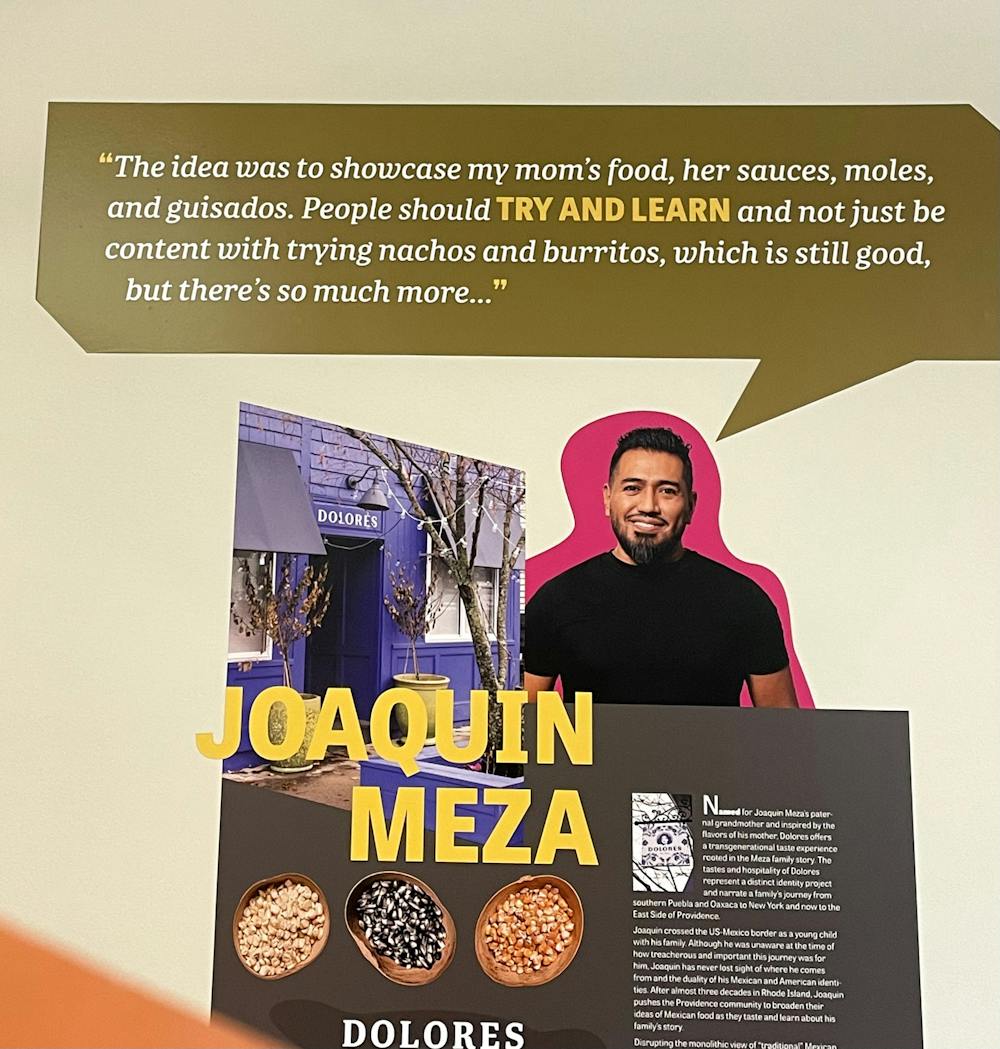Since March 20, the experiences of five Latinx and Caribbean restaurateurs in Providence have been featured in the Ruth J. Simmons Center for the Study of Slavery and Justice along with the experiences of four other local restaurant owners. The common thread stringing the stories together: Each restaurant owner migrated to the United States with hopes of bringing a piece of their heritage along with them.
Titled “Serving a Plate Back Home: Migration Stories of Latinx and Caribbean Restauranteurs in Providence, R.I.,” the exhibition consists of an audio interview series and photo collection that “offers a glimpse into the personal journeys and intentions behind five restaurants that function as enclaves for Latinx and Caribbean communities in Providence,” according to the event’s website.
The exhibition is part of an Andrew W. Mellon Foundation Sawyer Seminar — “Rethinking the Dynamic Interplay of Migration, Race and Ethnicity in the Caribbean and Latin America” — spearheaded by the CSSJ, the Center for Latin American and Caribbean Studies and the Department of Africana Studies, as well as the Rites and Reason Theatre. Sawyer Seminars provide funding to create what a University press release described as “in effect, a temporary, Mellon Foundation-funded research center.”
In addition to Meza, the exhibition showcases the stories of four more restaurant owners — Milena Pagán of Little Sister, Yveline “Eve” Bontemp of Garden of Eve, Welbi Genao of Trap Box PVD and Jenny Paiz of Mi Guatemala.
As well as providing audio recordings of each interview, the exhibition experiments with other forms of media; the walls were decorated with various headshots, quotes and pictures of traditional meals each owner brought to Providence.
Curator and CSSJ Graduate Fellow for the Study of the Public History of Slavery Kennedy Jones GS said that the unique implementation of auditory and visual media in the space was intentional.
“It was my job to communicate these interviews in an exhibition space,” Jones said. “Because all of the research for the exhibition came out of the interviews, I wanted to make sure their voices were coming through as much as possible, hence the use of lots of quotations throughout the space.”
The quotations on display from each restaurant owner offer visitors personal anecdotes about honoring culture through food.
In the exhibition, Paiz, who owns Mi Guatemala on Atwells Avenue, told interviewer Kristen Kolenz, previously a postdoctoral fellow for the Sawyer Seminar, that she didn’t fully understand the name of the restaurant her father founded until she got older.
“For a long time I would ask my dad, ‘Why did you call it ‘Mi Guatemala,’ that’s a weird name,’” Paiz told Kolenz in the exhibition. “And then when I got older, he sat me down and said, ‘Because it was my little piece of Guatemala that I was able to contribute to the community.’”
Now, Paiz runs Mi Guatemala with her family and shares the same goal as her father.
Pagán’s interview in the exhibition emphasizes that she wants her Puerto Rican cafe “Little Sister” to be open to all people.
“I want people from all walks of life to feel like they can come here, find something that they like and mingle with each other,” her display in the exhibition reads.
Genao, who owns the Trap Box PVD food truck, said in the interview featured in the exhibition that his menu aims to “touch the soul.” His food truck offers “a modern twist on authentic Latin food,” according to its website.
“My mom and dad are from the Dominican Republic and food is big over there,” he said in his interview. “When you cook for somebody and you cook it from love, people can tell that."
Bontemp, in her interview featured in the exhibition, said she wants Garden of Eve, her family-owned Caribbean restaurant, to “open hearts.”
“Garden of Eve is a unique cuisine that connects the community and the youth whose parents were immigrants,” Bontemp said in her interview with Kolenz. “We are making a bridge with the stuff their grandmother used to make or their mother that is no longer with them.”
For Joaquin Meza, owner of Mexican restaurant Dolores, “it’s about food but it is my identity,” he told Kolenz in the interview.
Meza’s family founded the restaurant in 2019, named for Meza’s paternal grandmother and “inspired by the flavors of his mother.”
Makieda Mckenzie ’25, a student who immigrated to the U.S. from Jamaica in her early childhood, visited the exhibition “with no expectations on what it was going to be like.”
Now, Mckenzie plans on making a visit to Garden of Eve to enjoy traditional food from “Jamaica, my home.”
“I feel like there are very little options for a lot of Caribbean food in Providence,” Mckenzie said. “It’s so refreshing to see a Caribbean person create a piece of home here.”
Jones explained that she wants visitors “to see — just as I learned in being a part of this project — that these restaurants are more than places to have a great meal, but these are sites rich with innovation, imagination and deeply personal stories of passionate entrepreneurs that are creating spaces of transnational gathering.”
The physical exhibition is scheduled to close Friday, but the virtual exhibition will remain online for community members to learn more about the perspectives of these local restaurant owners showcasing their culture.

Sofia Barnett is a University News editor overseeing the faculty and higher education beat. She is a junior from Texas studying history and English nonfiction and enjoys freelancing in her free time.





